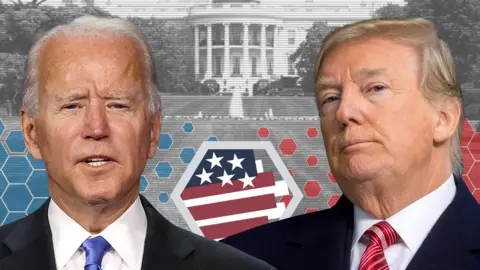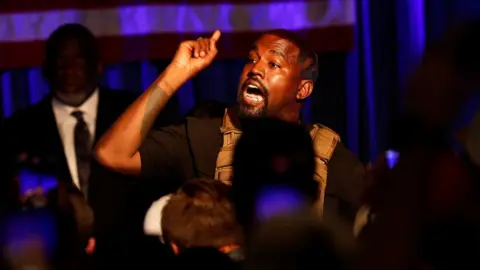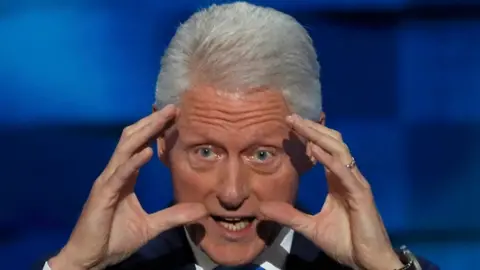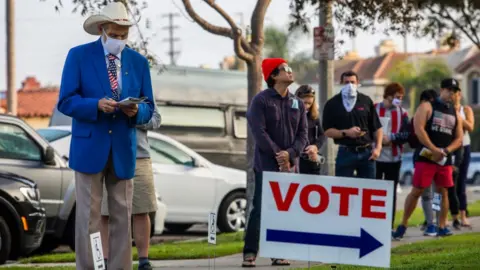US Election 2020: Can you only vote Trump or Biden and other questions
 BBC
BBCAre Donald Trump and Joe Biden the only candidates for president? And why are the voting systems in Maine and Nebraska different to the rest of the United States?
Here are some of your key questions around the US election answered.

If you vote for someone who is not a Democrat or Republican, what happens to your vote? Jan, Australia
Your vote will still count. Because the focus of the 2020 US presidential election campaign is on just two men, Donald Trump and Joe Biden, it's very easy to forget that there are many other candidates.
According to the Federal Election Commission, a whopping 1,214 presidential hopefuls have filed papers for this election.
The vast majority of candidates, including the musician Kanye West, only stood in a few places.
 Reuters
ReutersHowever the Libertarian Party's Jo Jorgensen was on the ballot for all 50 states and the District of Columbia.
In October, the BBC heard from three of these other presidential candidates.
In 1968, a third-party candidate, George Wallace, garnered nearly ten million votes, winning five states. In 1992, nearly 20 million people voted for Ross Perot, although he won no states.

Why do Maine and Nebraska split their electoral college votes? Elizabeth, London
Maine and Nebraska are the only two US states where the candidate with most votes does not take all of its electoral college votes.
Instead, they use what is called the "congressional district method". Each state's electoral college vote is equal to its number of Senate seats - always two - plus its number of congressional districts.
The candidate with most votes in each congressional district takes one electoral college vote and then whoever wins the state-wide vote gains two more college votes.
Having briefly used the split-vote method in the 1820s, Maine reintroduced it in 1969. This was because of concerns that a candidate in a three-way presidential election, like that of 1968, could take all the state's electoral college votes with little over a third of the popular vote.
Nebraska has used the split-vote system since 1996, according to one commentator, "to attract presidential candidates to a state they usually ignore because it's so reliably conservative."

How does the point system work with the presidential race? Robert Williams, Sacramento
The number of electoral college members - known as electors - from each state is roughly in line with the size of its population. Each state has as many electors as it has lawmakers in the US Congress (representatives in the House and senators).
California has the most electors - 55 - while some states with smaller populations like Wyoming, Alaska and North Dakota (and Washington DC) have the minimum of three. There are 538 electors in total.
Each elector represents one electoral vote, and a candidate needs to gain a majority of the votes - 270 or more - to win the presidency.

Who are the members of the electoral college, how are they chosen and how long do they serve in the role? - Penny Reid, Northumberland, UK
The members of the electoral college are usually nominated by the Republican and Democratic parties for each election.
There are different rules for nominating them in each state, and they are officially selected on polling day.
The college members - known as electors - often have connections in the US political parties, like activists or former politicians.
Bill Clinton was a Democratic elector in 2016, and Donald Trump Junior was put forward by the Republicans.
 Reuters
Reuters
Could Donald Trump try to contest the results of the election? - Basel, Israel
Yes. Both campaigns have said they're already preparing for legal disputes following the election.
They have a right to demand a recount in most states, usually if the result there is tight.
There's been a surge in postal voting this year, and it's also possible that the validity of these ballots could be challenged in court.
These lawsuits could make their way up to the US Supreme Court - the ultimate legal authority in the US.
This happened in 2000, when the Supreme Court stopped a recount in Florida and ruled in favour of Republican George W Bush, who became president.

What influence does the national vote have on the way the electoral college votes? - Caroline Bonwitt, Gloucestershire, UK
US presidents are not decided by the national popular vote, but by winning in enough states.
The winner in each state gets the support of a number of electors based roughly on its population.
These electors meet a few weeks after polling day - forming the electoral college - to vote to officially nominate the next president.
To win the White House, 270 electoral votes are needed.

Pretty much everyone in the world is fed up with this "electoral college" nonsense. So how hard is it to just make US elections a majority vote and dump the college? - Judy, BC, Canada
The US electoral system is laid out in the constitution, so changing it would require a constitutional amendment.
This would have to be approved by two-thirds of both the Senate and the House of Representatives, or the same proportion of state legislatures. This would then need to be ratified by three-quarters of US states.
This is very unlikely to be successful, although there have been attempts to change the system in the past.
There is an ongoing effort by some states to award their electoral votes to the winner of the popular vote, no matter who wins there. This is a way off, but would effectively nullify the electoral college.



What happens if it's a tie? - Chinga, China
There are 538 electoral votes up for grabs, with a fixed number of electors representing each state based roughly on the size of its population.
This means a draw is possible at 269 votes each, although unlikely.
If no candidate gains a majority of votes in the electoral college, it would be up to the US Congress to decide.
Members of Congress elected in the 2020 elections would take on this responsibility.
The House of Representatives would vote to decide the president, with each state delegation having one vote - a majority of 26 is needed for a candidate to become president.
The Senate would select the vice-president, with all 100 senators having a vote.

Who will decide the presidency if there is no definitive winner via the electoral college? -Robert Pallone, Maryland
If there's no definite winner in the electoral college, it would mean there's either been a tie in the overall result (covered above), or that ongoing legal challenges in disputed states have not been resolved, and so their electors cannot be chosen.
The electoral college - whose job it is to formally nominate the next president - meets on 14 December this year. Electors must be put forward by each state for their winning candidate by then.
If the election results are still disputed and certain states can't decide which candidate to give their electors to, then it would be up to the US Congress to step in.
The US constitution imposes a final deadline - the term of the president (and vice-president) expires on 20 January at noon.
If Congress has been unable to choose the winner by then, there's a line of succession set out in law.
First in line is the Speaker of the House of Representatives, currently Nancy Pelosi, followed by the second highest ranking member of the Senate, currently Charles Grassley.
This has never happened before so it's unclear how, under these exceptional circumstances, this would work in practice.

What makes some states' votes count more than others? - S Robertson, Sussex, UK
Candidates tend to campaign in states where the result is uncertain - that's why people say the votes in these states "count more".
These places are known as battleground or swing states.
The US electoral system means that in all but two states, the margin of victory doesn't matter, as whoever gets the most votes wins all the electoral votes on offer in that state.
 Getty Images
Getty ImagesIn states which are almost guaranteed to vote a certain way - like California (Democrat) or Alabama (Republican) - candidates have less incentive to campaign.
They'll put most effort into a handful of tight races, such as Florida and Pennsylvania, targeting voters that could go either way.

If postal votes that get counted several days after the election, change the final tally of a state from Trump to Biden or vice-versa, then what is the protocol for re-announcing a winner? - Charlie Etheridge, Kent, UK
There's no legal requirement to announce a winner on election night - this is done as a projection by major US media outlets.
The full count is never completed on the night - but enough votes are usually in to confirm a winner.
These are unofficial results which are certified only weeks later, when confirmed by state officials.
This year, the US media will likely be more cautious in calling a winner, as there are more postal votes and these take longer to count.
This could mean the leader on election night in some states could end up losing once all the votes - including postal ballots - are counted.


Your Questions Answered: What questions do you have about the US election?
How does vote counting work? When will we get the final results? The US election can be confusing, especially this year. The BBC is here to help make sense of it. Please send us your questions about election day and beyond.
In some cases, your question will be published, displaying your name, age and location as you provide it, unless you state otherwise. Your contact details will never be published. Please ensure you have read our terms & conditions and privacy policy.
